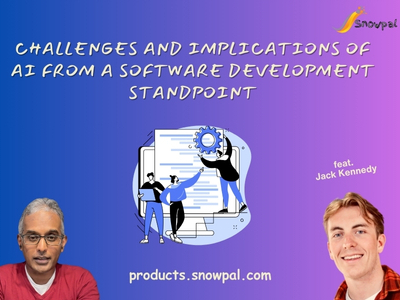Challenges and Implications of AI from a Software Development standpoint (feat. Jack Kennedy)
Whippy AI combines communication and automation for businesses. Apple's approach to AI may allow them to catch up quickly. AI is changing user expectations and experiences.
In this episode, Krish Palaniappan interviews Jack Kennedy, co-founder and CTO of Whippy AI. They discuss the challenges and implications of AI in business, focusing on Whippy’s all-in-one communication and automation platform. Jack shares insights on the evolution of AI, the importance of understanding customer needs, and how companies like Apple are navigating the AI landscape. The conversation also explores the balance between traditional software and AI innovations, emphasizing the need for user-friendly interfaces and tangible value in AI features. They explore the evolution of user interfaces, particularly in the context of AI and automation. They discuss the balance between traditional software interfaces and new chat-based interfaces, emphasizing the importance of user experience and the potential pitfalls of over-automation. The dialogue also touches on the cultural aspects of software development and how these influence the tech stack choices of companies today. The conversation concludes with insights into the tech stack used by Jack's company, highlighting the tools and technologies that drive their development process. They discuss the integration of AI in software development, the importance of cloud infrastructure, and the dynamics of remote teams. They explore the future of software development, the impact of AI on job markets, and the role of education in preparing for these changes. Jack emphasizes the value of talent regardless of location and the need for engineers to adapt to new technologies and methodologies.
Takeaways
Whippy AI combines communication and automation for businesses.
The platform focuses on SMS and voice communication.
AI can replace certain employee functions in customer support.
Understanding customer needs is crucial for product development.
AI should enhance, not overshadow, core business problems.
Apple's approach to AI may allow them to catch up quickly.
AI features should provide tangible value to users.
User interfaces are evolving towards conversational interactions.
AI can accelerate the delivery of software solutions.
Balancing traditional software with AI is essential for user experience. The evolution of user interfaces is crucial for modern software.
AI is changing user expectations and experiences.
Balancing automation with human interaction is essential.
Rethinking software development processes can lead to better outcomes.
Cultural differences impact software development practices.
The tech stack should be chosen based on project needs.
Iterative development is key to successful software projects.
AI can enhance the software development lifecycle.
Understanding user needs is critical for product success.
The future of software may involve more AI-driven interactions. AI tools are integrated into various aspects of software development.
Cloud infrastructure is primarily based on AWS, with a focus on simplicity.
Remote teams require a robust engineering setup for effective collaboration.
Good engineering principles remain relevant despite changing technologies.
Outsourcing is evolving with the rise of AI and local talent availability.
AI can replace certain tasks but not all roles in software development.
Education needs to adapt to prepare students for modern engineering challenges.
The composition of engineering teams is changing due to AI and remote work.
Engineers should focus on problem-solving and adapting to new tools.
Talent is distributed globally, and skills can be found anywhere.
Podcast
Transcript
Snowpal Products
Backends as Services on AWS Marketplace
Mobile Apps on App Store and Play Store
Web App
Education Platform for Learners and Course Creators



